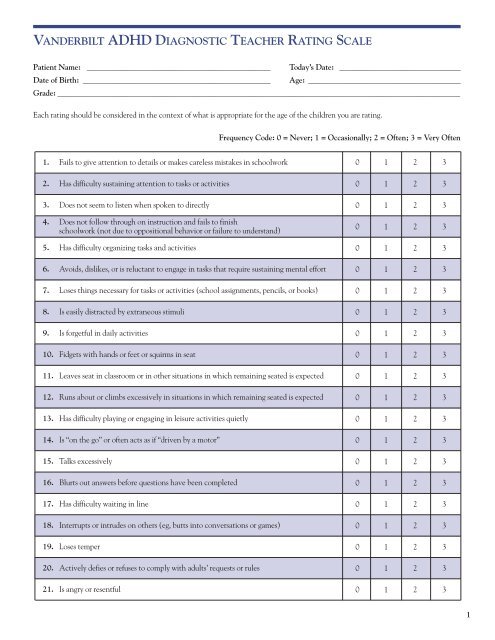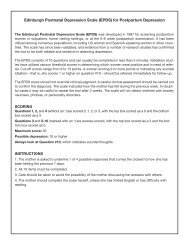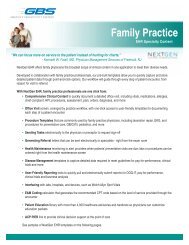VANDERBILT ADHD DIAGNOSTIC TEACHER RATING SCALE
VANDERBILT ADHD DIAGNOSTIC TEACHER RATING SCALE
VANDERBILT ADHD DIAGNOSTIC TEACHER RATING SCALE
You also want an ePaper? Increase the reach of your titles
YUMPU automatically turns print PDFs into web optimized ePapers that Google loves.
<strong>VANDERBILT</strong> <strong>ADHD</strong> <strong>DIAGNOSTIC</strong> <strong>TEACHER</strong> <strong>RATING</strong> <strong>SCALE</strong><br />
Patient Name: _______________________________________________ Today’s Date: _______________________________<br />
Date of Birth: ________________________________________________ Age: _______________________________________<br />
Grade: _______________________________________________________________________________________________________<br />
Each rating should be considered in the context of what is appropriate for the age of the children you are rating.<br />
Frequency Code: 0 = Never; 1 = Occasionally; 2 = Often; 3 = Very Often<br />
1. Fails to give attention to details or makes careless mistakes in schoolwork<br />
2. Has difficulty sustaining attention to tasks or activities<br />
3. Does not seem to listen when spoken to directly<br />
4. Does not follow through on instruction and fails to finish<br />
schoolwork (not due to oppositional behavior or failure to understand)<br />
5. Has difficulty organizing tasks and activities<br />
6. Avoids, dislikes, or is reluctant to engage in tasks that require sustaining mental effort<br />
7. Loses things necessary for tasks or activities (school assignments, pencils, or books)<br />
8. Is easily distracted by extraneous stimuli<br />
9. Is forgetful in daily activities<br />
10. Fidgets with hands or feet or squirms in seat<br />
11. Leaves seat in classroom or in other situations in which remaining seated is expected<br />
12. Runs about or climbs excessively in situations in which remaining seated is expected<br />
13. Has difficulty playing or engaging in leisure activities quietly<br />
14. Is “on the go” or often acts as if “driven by a motor”<br />
15. Talks excessively<br />
16. Blurts out answers before questions have been completed<br />
17. Has difficulty waiting in line<br />
18. Interrupts or intrudes on others (eg, butts into conversations or games)<br />
19. Loses temper<br />
20. Actively defies or refuses to comply with adults’ requests or rules<br />
21. Is angry or resentful<br />
0 1 2 3<br />
0 1 2 3<br />
0 1 2 3<br />
0 1 2 3<br />
0 1 2 3<br />
0 1 2 3<br />
0 1 2 3<br />
0 1 2 3<br />
0 1 2 3<br />
0 1 2 3<br />
0 1 2 3<br />
0 1 2 3<br />
0 1 2 3<br />
0 1 2 3<br />
0 1 2 3<br />
0 1 2 3<br />
0 1 2 3<br />
0 1 2 3<br />
0 1 2 3<br />
0 1 2 3<br />
0 1 2 3<br />
1
<strong>VANDERBILT</strong> <strong>ADHD</strong> <strong>DIAGNOSTIC</strong> <strong>TEACHER</strong> <strong>RATING</strong> <strong>SCALE</strong><br />
Each rating should be considered in the context of what is appropriate for the age of the children you are rating.<br />
Frequency Code: 0 = Never; 1 = Occasionally; 2 = Often; 3 = Very Often<br />
22. Is spiteful and vindictive<br />
23. Bullies, threatens, or intimidates others<br />
24. Initiates physical fights<br />
25. Lies to obtain goods for favors or to avoid obligations (ie, “cons” others)<br />
26. Is physically cruel to people<br />
27. Has stolen items of nontrivial value<br />
28. Deliberately destroys others’ property<br />
29. Is fearful, anxious, or worried<br />
30. Is self-conscious or easily embarrassed<br />
31. Is afraid to try new things for fear of making mistakes<br />
32. Feels worthless or inferior<br />
33. Blames self for problems, feels guilty<br />
34. Feels lonely, unwanted, or unloved; complains that “no one loves” him or her<br />
35. Is sad, unhappy, or depressed<br />
0 1 2 3<br />
0 1 2 3<br />
0 1 2 3<br />
0 1 2 3<br />
0 1 2 3<br />
0 1 2 3<br />
0 1 2 3<br />
0 1 2 3<br />
0 1 2 3<br />
0 1 2 3<br />
0 1 2 3<br />
0 1 2 3<br />
0 1 2 3<br />
0 1 2 3<br />
PERFORMANCE<br />
Problematic Average Above Average<br />
Academic Performance<br />
1. Reading 1 2 3 4 5<br />
2. Mathematics 1 2 3 4 5<br />
3. Written expression 1 2 3 4 5<br />
Classroom Behavioral Performance<br />
1. Relationships with peers 1 2 3 4 5<br />
2. Following directions/rules 1 2 3 4 5<br />
3. Disrupting class 1 2 3 4 5<br />
4. Assignment completion 1 2 3 4 5<br />
5. Organizational skills 1 2 3 4 5<br />
2

















